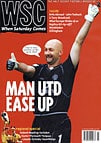 Thanks to the influx of foreign players, British football now attracts an increasing number of journalists from countries which previously paid it scant attention. We cornered three of them – Ronnie Reng from Germany, Marie-Jose Kleef from the Netherlands and Italian Filippo Ricci – to find out what impression it had made on them
Thanks to the influx of foreign players, British football now attracts an increasing number of journalists from countries which previously paid it scant attention. We cornered three of them – Ronnie Reng from Germany, Marie-Jose Kleef from the Netherlands and Italian Filippo Ricci – to find out what impression it had made on them
When you first came to England, what was the one thing that most surprised you about football here?
Ronnie Reng That it’s still conducted in a childish manner – and I mean that in a positive way. Both in the way they play and how the supporters watch the game. One of the first matches I saw here was when Dortmund were playing at Man Utd. About half an hour before kick-off I thought I had the wrong day because there was nobody there. The fans didn’t show up until five minutes before kick off. I think that’s a good thing – they clap if they like something or they boo and then they go home. So it’s still pure entertainment. And it’s also played in a childish way. Players want to attack all the time, they don’t want to stop and think, and the supporters clap if somebody really hoofs it forward or if someone makes a great tackle, even if it would have been more sensible to look up and pass.
Marie-José Kleef The amount of tackles in a game is unbelievable. This season I was at Leicester v Aston Villa and the only thing happening was people tackling each other. There weren’t two passes in a row. The players were never waiting for the right moment, just pushing all the time.
Filippo Ricci For me it was Chelsea v Liverpool and to find that the away fans were just one row away from the press box. When people stood up, the journalists were asking if they could sit down – and people did. Having no fences in the stadiums and having opposing fans in the best position to see the game was very strange. In Italy they would be stuck in some corner surrounded by police with the worst views of the game.
Read more…
 Ken Booth, the current Rotherham United owner, has been trying to sell the club almost since he bought it. Nigel Wilkes tells us exactly who the chairman is
Ken Booth, the current Rotherham United owner, has been trying to sell the club almost since he bought it. Nigel Wilkes tells us exactly who the chairman is